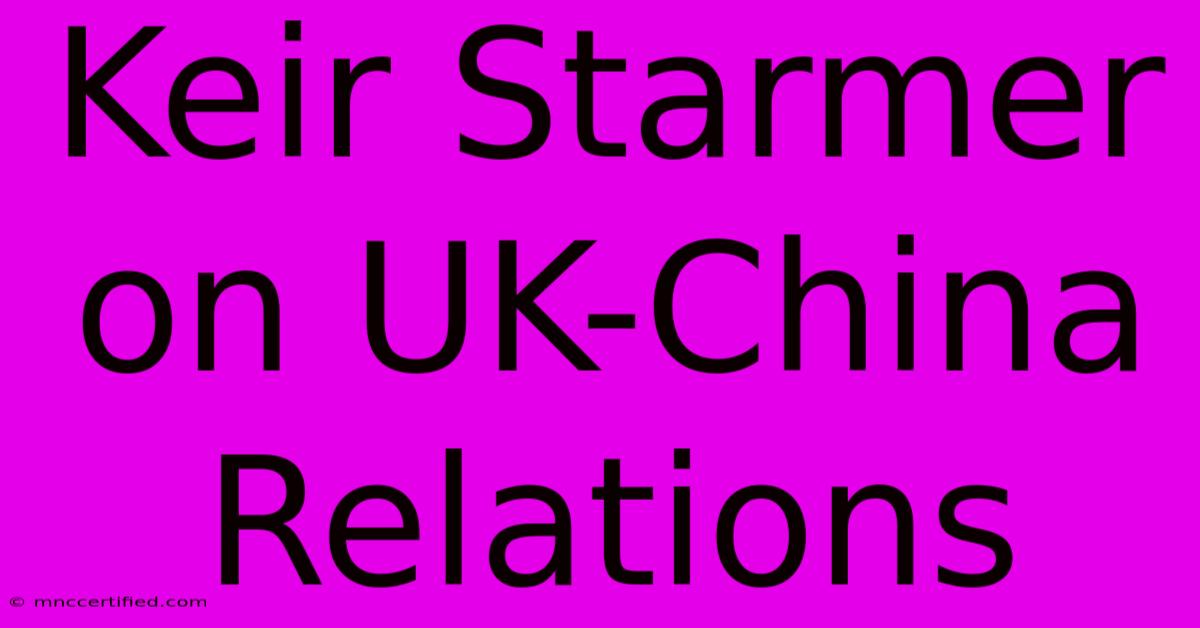Keir Starmer On UK-China Relations

Table of Contents
Keir Starmer on UK-China Relations: A Balancing Act
Keir Starmer, the current leader of the UK Labour Party, has adopted a nuanced stance on UK-China relations, navigating the complex terrain of economic engagement and human rights concerns. His approach represents a departure from the sometimes more overtly confrontational rhetoric of some within his party and offers a potentially significant shift in Labour's foreign policy should they win the next general election. This article will delve into Starmer's key positions, highlighting the challenges and opportunities inherent in the UK's relationship with China.
A Pragmatic Approach: Balancing Trade and Human Rights
Starmer's approach to China can be characterized as pragmatic. He acknowledges the significant economic ties between the UK and China, recognizing the potential benefits of trade and investment. However, he's equally vocal about the need to hold China accountable for its human rights record, particularly concerning issues in Xinjiang, Hong Kong, and Tibet. This balancing act is crucial for Labour, attempting to appeal to both pro-business and human rights-focused segments of the electorate.
Economic Engagement: Opportunities and Risks
Starmer hasn't advocated for a complete decoupling from the Chinese economy. He understands the importance of trade for the UK's economic prosperity and the potential benefits of collaboration in areas like climate change and global health. However, he emphasizes the need for a more robust approach to managing economic risks associated with China, including the issue of economic coercion and ensuring fair competition. This includes calls for greater diversification of supply chains and a reduction of reliance on single-source suppliers. The keywords here are economic diversification, supply chain resilience, and fair trade.
Human Rights: A Firm Stance, But Diplomatic Engagement
While acknowledging the economic benefits of engagement, Starmer has consistently condemned China's human rights abuses. He's been a strong critic of the situation in Xinjiang, expressing deep concern over reports of Uyghur genocide and calling for targeted sanctions against those responsible. Similarly, he's voiced his support for the people of Hong Kong and criticized the erosion of their autonomy. The key here is to balance strong condemnation with the need for diplomatic engagement to pursue meaningful change. Therefore, phrases like diplomatic pressure, targeted sanctions, and human rights dialogue are vital in articulating Starmer's position.
Differentiation from Previous Labour Stances
Starmer's stance represents a significant shift from some previous Labour approaches to China. While previous leaders sometimes adopted a more pro-engagement stance, prioritising economic ties over human rights concerns, Starmer is attempting to strike a more balanced position. This acknowledges the concerns of those who prioritize human rights while also recognizing the economic realities of the UK-China relationship. The keywords here are strategic autonomy, responsible engagement, and human rights-focused diplomacy.
The Future of UK-China Relations Under a Potential Labour Government
Should Labour win the next general election, Starmer's approach to China will shape UK foreign policy for years to come. His emphasis on a balanced approach – combining economic pragmatism with a firm commitment to human rights – will likely involve:
- Strengthening alliances: Closer collaboration with like-minded countries to exert pressure on China regarding human rights.
- Targeted sanctions: Imposing specific sanctions on individuals and entities responsible for human rights abuses.
- Promoting human rights dialogue: Engaging in diplomatic efforts to improve China's human rights record.
- Diversifying trade partnerships: Reducing the UK's over-reliance on China for key goods and services.
The success of this strategy will depend on the ability of a potential Labour government to navigate the complex geopolitical landscape, balancing the need for economic engagement with the moral imperative to uphold human rights. The continued monitoring of Keir Starmer’s statements and actions will be crucial in understanding the future trajectory of UK-China relations under a Labour government.
Keywords: Keir Starmer, UK-China relations, human rights, trade, economic engagement, sanctions, Uyghur genocide, Hong Kong, Tibet, economic coercion, supply chain resilience, diplomatic pressure, strategic autonomy, responsible engagement, human rights-focused diplomacy.

Thank you for visiting our website wich cover about Keir Starmer On UK-China Relations. We hope the information provided has been useful to you. Feel free to contact us if you have any questions or need further assistance. See you next time and dont miss to bookmark.
Featured Posts
-
Financial Crisis Hits Spirit Airlines
Nov 19, 2024
-
Giants Bench Jones 23 M Risk Avoided
Nov 19, 2024
-
Lee Carsley On Englands Next Generation
Nov 19, 2024
-
Rising Mortgages Starmer On Budgets Role
Nov 19, 2024
-
Coleen Rooney Wagatha Christie Trial On I M A Celeb
Nov 19, 2024